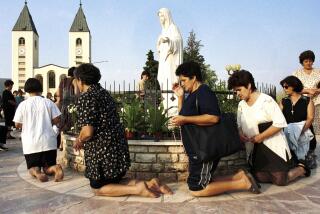Vatican OKs New U.S. Policy on Abuse
VATICAN CITY — The Vatican gave its approval Monday to the revised U.S. bishops’ policy to protect children and combat sex abuse by the clergy, declaring the need to restore the image of the priesthood in a scandal that has rocked the Roman Catholic Church.
Approval had been expected after U.S.-Vatican differences in the plan were worked out by a joint commission last month.
The policy allows bishops to conduct a confidential, preliminary inquiry when a molestation claim is made to determine whether it is plausible. If it is, the accused priest is to be put on leave and then must go before a clerical tribunal.
The original policy, which the bishops approved in Dallas six months ago, would have allowed church leaders to pull priests out of their jobs as soon as they were accused. Vatican officials expressed concern that that approach would deny priests due process.
Under the revised policy, bishops are compelled to obey local civil law on reporting abuse claims, but not more than that. Church leaders, however, have pledged to report all allegations involving children.
Denouncing priestly pedophilia as “evil,” the Vatican released a letter saying the church would have to throw all its energy into winning back the respect of U.S. Catholics.
The Vatican announcement came three days after Pope John Paul II accepted the resignation of Cardinal Bernard Law as archbishop of Boston, removing a figure whose handling of abuse allegations made him a lightning rod for victims’ groups, lay Catholics and some priests.
U.S. bishops say the new guidelines still require guilty clerics to be removed from public ministry -- saying Mass, teaching in Catholic schools, wearing a Roman collar -- after a single case of abuse. Bishops can also ask the Vatican to waive the church’s statute of limitations, which requires victims to come forward by age 28.
The Survivors Network of Those Abused by Priests has criticized the revised rules, saying they give too much discretion to bishops.
Review boards including lay people will monitor how dioceses respond to abuse, but the policy stresses that only bishops can manage clergy.
More to Read
Sign up for Essential California
The most important California stories and recommendations in your inbox every morning.
You may occasionally receive promotional content from the Los Angeles Times.










